新概念2册第一课讲解
新概念英语2 Lesson1课件(共60张PPT)

Seatbelt = safety belt
• Fasten your seatbelt, please!
单词表示抽象概念:
席位
• Win a seat in the congress 赢得一个议会席位 • Lose a seat in the congress 丢掉一个议会席位
☆attention n.注意
Last week, I went to the theatre. • 去看戏
• 注意拼写规则: • theatre (Br)= theater (US) • centre = center • metre = meter
Last week I went to the theatre. 译: 上星期我去看戏。 go to the +地点 表示去某地做什么 go to the theatre = go to the theatre to see a play去剧场看戏 go to the cinema =see a film去电影院看电影
I had a very good seat. The play was very interesting. I did not enjoy it. 我的座位很好戏很有意思无法欣赏。
interesting adj .引起兴趣的,有趣的 eg: This man is very interesting. The book is so interesting that I do not want to put it down. interested adj. .对…感兴趣的 be interested in sth/ doing sth eg. I am interested in sports. Professor Qiao is very interested in collecting stamps. enjoy v.享受…之乐,欣赏,喜爱 enjoy doing sth enjoy swimming 喜欢游泳。 How did you enjoy your trip 旅行如何? enjoy one's dinner 饭吃得津津有味。
新概念二册第一课讲解Aprivateconversa

句子解析
Last week I went to the theatre. I had a very good seat. The play was very interesting. I did not enjoy it.
○ go to somewhere 去某地 ○ seat 单数可数名词,因此前面用不定冠词a修饰 ○ enjoy it 欣赏它,enjoy oneself=have a good time 玩的开心
conversation n. 谈话;会话;社交;谈话技巧
private conversation私人通话;私密通讯 • 例句:Education begins a gentleman, conversation completes him. • 一个绅士源于教育,成于社交。
theatre n. 剧场,戏院,电影院
•
Can you play with us? 你能和我们一起玩吗?
• lou New dly adv. w大声o地r;响d亮s的a(是n形d容词elouxdp的副re词)ssions
• speak loudly大声说话;大声的说;大声地说话;大声地说 • shout loudly高声喊叫 • They cheered loudly for their football team.他们大声地为自己的足
get angry 生气
hear sb. 听到某人(说话)
turn round=turn around 转身
pay attention 注意
句
专题二:肯定句与否定句的转换
子
肯定句转换成否定句即是在谓语动词前加助动词,然后在
解பைடு நூலகம்
助动词的后面加单词not,若原来的动词是第三人称单数
新概念英语第二册第一课课文详解
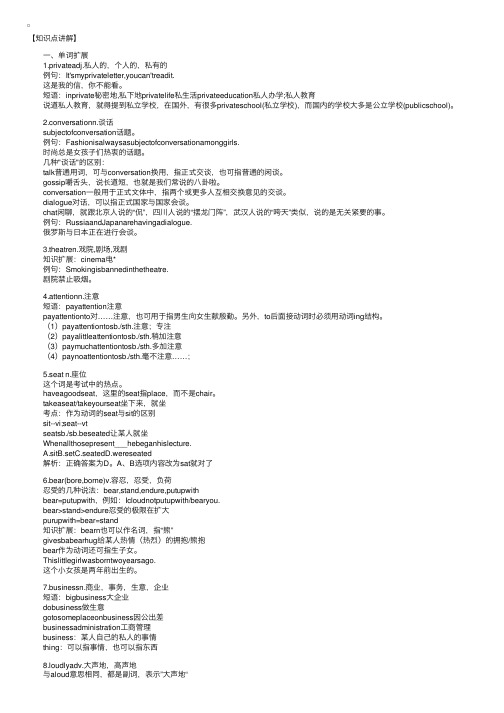
【知识点讲解】 ⼀、单词扩展 1.privateadj.私⼈的,个⼈的,私有的 例句:It'smyprivateletter,youcan'treadit. 这是我的信,你不能看。
短语:inprivate秘密地,私下地privatelife私⽣活privateeducation私⼈办学;私⼈教育 说道私⼈教育,就得提到私⽴学校,在国外,有很多privateschool(私⽴学校),⽽国内的学校⼤多是公⽴学校(publicschool)。
2.conversationn.谈话 subjectofconversation话题。
例句:Fashionisalwaysasubjectofconversationamonggirls. 时尚总是⼥孩⼦们热衷的话题。
⼏种"谈话"的区别: talk普通⽤词,可与conversation换⽤,指正式交谈,也可指普通的闲谈。
gossip嚼⾆头,说长道短,也就是我们常说的⼋卦啦。
conversation⼀般⽤于正式⽂体中,指两个或更多⼈互相交换意见的交谈。
dialogue对话,可以指正式国家与国家会谈。
chat闲聊,就跟北京⼈说的“侃”,四川⼈说的“摆龙门阵”,武汉⼈说的“咵天”类似,说的是⽆关紧要的事。
例句:RussiaandJapanarehavingadialogue. 俄罗斯与⽇本正在进⾏会谈。
3.theatren.戏院,剧场,戏剧 知识扩展:cinema电* 例句:Smokingisbannedinthetheatre. 剧院禁⽌吸烟。
4.attentionn.注意 短语:payattention注意 payattentionto对……注意,也可⽤于指男⽣向⼥⽣献殷勤。
另外,to后⾯接动词时必须⽤动词ing结构。
(1)payattentiontosb./sth.注意;专注 (2)payalittleattentiontosb./sth.稍加注意 (3)paymuchattentiontosb./sth.多加注意 (4)paynoattentiontosb./sth.毫不注意……; 5.seat n.座位 这个词是考试中的热点。
新概念第二册第一课讲解

lesson1---- A private conversation课文内容:Last week I went to the theatre(see a film,go to the cinema).I had a very good seat. The play was very interesting.I did not enjoy it.A young man and a young woman were sitting behind me.They were talking loudly.I got very angry. I could not hear the actors.I turned round. I looked at the man and the woman angrily.They did not pay any attention.In the end, I could not bear it.I turned round again. ‘I can't hear a word!’I said angrily.‘It's none of your business,’the young man said rudely.‘This is a private conversation!’NEW WORDS AND EXPRESSIONS生词和短语★private adj。
私人的 n。
士兵,列兵(individual, personal)in private 秘密地:非公开地;秘密地或在私下地privacy:隐私 it's a privacy. adj。
privateer (战时特准攻击敌方商船的)武装民船,私掠船拯救大兵瑞恩,private soldier:大兵private citizen普通公民 , private life:私生活it's my private letter/house;private school(私立学校)public:公众的,公开的public school公立学校;public letter公开信;public place公共场所★conversation n。
新概念英语第二册 第一课(共22张PPT)

12. It’s none of your business. 关你屁事;这不关你的事。
class.上课期间你要专心听老师讲课。 15. ___I_n__th__e__e_n_d____they reached a place of safety.
他们终于到达了一个安全的地方。
16. Peter and Tom made up __in___th__e__e_n_d____.
彼特和汤姆最后和解了。 17. The shelf, too weak to ___b__e_a_r___all the books,
14. private ['praɪvət] adj. 私人的;个人的;私下的;私有的
The president is paying a private visit to Europe. 总统正在欧洲进行私人访问。 We each have our private views about it. 我们每个人对这件事都有自己的看法。
关你屁事;这不关你的事。 13. __r_u_d__e_l_y_ adv. 无礼地;粗暴地 14. __p__ri_v_a_t_e__ly___ adj. 私人的;个人的;
私下的;私有的 15. __c_o__n_v_e_r_s_a__ti_o_n_ n. 谈话;会话
Step 2 在语境中加深对词汇短语的理解与记忆,掌握其具体用法。 1. theatre [ˈθiːətər] n. 电影院,戏院;戏剧
新概念2册第一课讲解ppt课件

经营者提供商品或者服务有欺诈行为 的,应 当按照 消费者 的要求 增加赔 偿其受 到的损 失,增 加赔偿 的金额 为消费 者购买 商品的 价款或 接受服 务的费 用
Questions
• Where did the writer go last week? • Why didn’t he enjoy the play? • What did the young man say to the writer?
e.g. The play was very interesting
e.g. Last week I went to the theatre
• 人称代词/名词 + was/were + doing+其他 e.g. A young man and a young woman were
sitting behind me e.g. They were talking loudly.
经营者提供商品或者服务有欺诈行为 的,应 当按照 消费者 的要求 增加赔 偿其受 到的损 失,增 加赔偿 的金额 为消费 者购买 商品的 价款或 接受服 务的费 用
经营者提供商品或者服务有欺诈行为 的,应 当按照 消费者 的要求 增加赔 偿其受 到的损 失,增 加赔偿 的金额 为消费 者购买 商品的 价款或 接受服 务的费 用
能跟人)
新概念英语第二册Lesson1课件
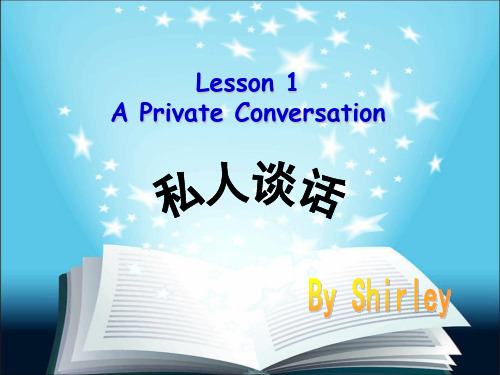
I could not hear the actors.
Key structures and usage
过去进行时:过去某个时间正在进行 或发生的动作 A young and a young woman were sitting behind me.
They were talking loudly.
• • • • • • • • • • • • • • •
【Key structures】 简单陈述句的语序 陈述句一定是有主语,有动词,有宾语,有句号 6 1 2 3 4 5 6 when? Who? Action Who? How? Where? When? Which? Which? What? What? 1 ---主语,一般由名词、代词或名词短语构成,通常位于动词之前,动词必 须与主语一致,即主语决定动词的单复数形式 2 ---谓语,由动词充当 3 ---宾语,一般为名词、代词或名词短语 4 ---副词或介词短语,对方式或状态提问,往往做状语 I like her very much 5 ---地点状语,一般在方式副词之后,时间副词之前 6 ---时间状语,可以放在句首或句末 简单陈述句一定不能少的是主语, 谓语. 如果问何时何地,是一个固定搭配 when and where
• • • • • •
★business n. 事, 生意 ① n. 生意 business man :生意人 do business: 做生意 ② n. 某人自己的私人的事情 It's my business. (指私人的事, 自己处理的 事) • It's none of your business. 不关你的事。
Language points
以下短语中名词前不加冠词:
新概念二册第一课知识点文档版

新概念二册第一课知识点文档版
新概念二册第一课“A private conversation”主要涉及以下知识点:
1.词汇:private、conversation、theatre、seat、play、loudly、
angry、angrily、attention、rudely、complain、got等。
2.语法:本课主要涉及一般现在时,用来表示经常性的动作或习
惯。
例如,“I always go to the cinema on Saturday.”(我总是在星期六去看电影)。
3.句型:本课出现了一些句型,例如“I had a very good seat.”
(我有个非常好的座位)、“The usher showed me to my seat.”
(引座员领我到座位上去)。
同时,本课也涉及一些表达情感和态度的词汇和短语,例如“I was very angry.”(我非常生气)。
4.听力:本课听力部分是关于在剧院里说话声音过大而引起不满
的对话,需要学生能够听懂并理解对话内容。
5.阅读:本课阅读部分是一篇关于私人谈话的文章,介绍了在公
共场合如何避免私人谈话打扰他人,并强调了尊重他人的重要性。
6.写作:本课写作部分是要求学生写一篇关于自己在电影院经历
的文章,描述自己在电影院里的座位、观影体验以及是否喜欢电影院等。
7.语音:本课语音部分是要求学生掌握单词的发音和语调,特别
是疑问句和陈述句的语调区别。
总之,新概念二册第一课主要涉及了词汇、语法、句型、听力、阅读、写作和语音等方面的知识点,需要认真学习和掌握。
新概念英语(第二册第1课讲解)
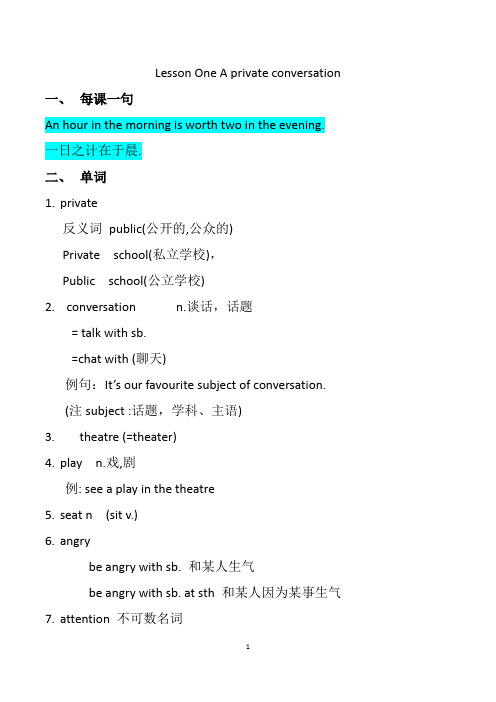
Lesson One A private conversation 一、每课一句An hour in the morning is worth two in the evening.一日之计在于晨.二、单词1.private反义词public(公开的,公众的)Private school(私立学校),Public school(公立学校)2.conversation n.谈话,话题= talk with sb.=chat with (聊天)例句:It’s our favourite subject of conversation.(注subject :话题,学科、主语)3.theatre (=theater)4.play n.戏,剧例: see a play in the theatre5.seat n (sit v.)6.angrybe angry with sb. 和某人生气be angry with sb. at sth 和某人因为某事生气7.attention 不可数名词pay attention to n./doing 注意做某事pay no attention to n./doing 一点都没注意pay much attention to n./doing 多加留心,多注意8.bear n.熊v.容忍(bore ,borne)类似单词:beer(啤酒),dear(亲爱的)同义词:stand(容忍),(stood,stood)stand doing sth 容忍做某事例句: I can’t stand it. 我一点不喜欢.9.business(ness名词后缀) 事;商业;生意business man商人; business woman 女商人10.k ey n.钥匙the key to the door键盘keyboard答案the key to the question = the answer to the question 关键的,重点的key school 重点学校11.r ude adj.无礼的反义词:polite; 近义词: impolite(p 开头的词,否定前缀im) Be rude to sb. 对…无礼Be friendly to sb. 对…友好Be polite to sb. 对…有礼貌注:否定前缀就当没看见,含有否定前缀的不是否定词。
(完整版)新概念英语2_Lesson1_知识点讲解
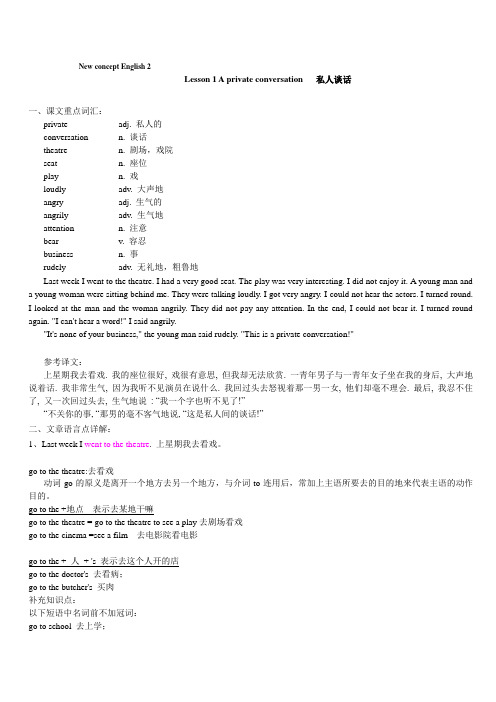
aloud,loud和loudly区别:
1aloud强调发出的声音能被听见,意思为“出声地”或“大声地”,常用read,call,think等动词连用。例如:Please read the text aloud.请朗读一下课文。
I’m a private citizen.(citizen n.公民)
private soldier大兵
注意:aloud, loudly只能用作副词;loud既可作副词,也可用作形容词。当副词用时,loudly与loud一样用来说明声音的强度,意思是"高声地,喧噪地",只是在动词后面loud比loudly更常用些。他们的反义是:quietly。例如:Don't talk so loud (loudly)----you'll wake the whole street.别那么大声说话,你快把左邻右舍都吵醒了。Someone knocked loudly (loud) at the door.有人在大声敲门。
Attention ,please.请注意!(口语)
pay attention注意
pay attention to …对……注意
You must pay attention to that girl.
pay a little attention稍加注意
pay much attention多加注意
pay more attention更多注意
Is the seat taken?这个位置有人吗?
新概念英语第二册第一课PPT课件

听力和口语训练
通过听一段对话或短文,回答 问题或模仿发音,提高学生的
听力和口语能力。
阅读和写作
阅读一篇短文并完成相关习题 ,然后根据所学单词和语法结
构写一篇小作文。
Overview of New
02 Concept English Volume 2, Lesson 1
Text content
Reading comprehension questions
阅读理解题1
Answer the following questions based on the given passage.
阅读理解题2
Summarize the main points of the given passage in your own words.
01 Course Introduction
Course objectives
语言知识目标
技能培养目标
学生将掌握约30个新单 词,学习基本语法结构, 如现在进行时和一般现
在时。
通过听、说、读、写四 个方面的练习,提高学 生的英语听说读写能力。
情感态度目标
培养学生对英语学习的 兴趣和积极性,鼓励他 们大胆开口说英语,不
Difficult points
Some students may find it challenging to distinguish between possessive adjectives and possessive nouns, as well as to use prepositions of place correctly in context. Instructors should provide additional examples and exercises to help students overcome these difficulties.
新概念二第一课(共23张PPT)
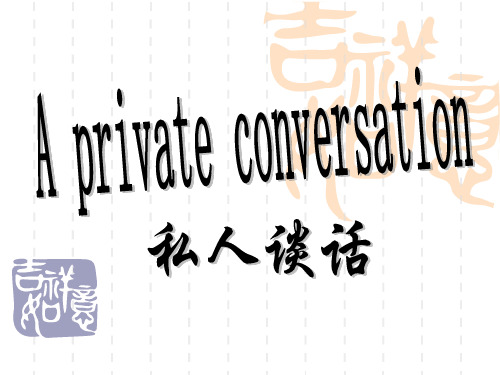
PS:时间状语可以置于开头 例:I read books carefully in
the library yesterday morning. = Yesterday morning, I read
books carefully in the library.
8.My job is repairing cars.(动名词做 表语)
9.The question is what you want to do.(从句做表语,即:表语从句)
二、主语———谓语 在这一句型中,动词为 不及物动词及不及物的动词词组。在有的 句子中,不及物动词可以有状语修饰。
1.The sun is rising. 2.I'll try. 3.Did you sleep well?(well做状语,修饰不
句型分析:
7.They did not pay any attention. 析: pay attention to sth/sb pay no attention to ..没有注意 8.It’s none of your business. 析:固定语法---不关你事!
本课语法—简单陈述句的语序
5.What do you want me to do?(不定式做宾补)
6.We thought him to be an honest man.(to be 做宾补)
7.He believed them to have discussed the problem.(不定式的完成式做宾补)
8.He believed her to be telling the truth.(不定 式的进行式做宾补)
新概念第二册第一课课件lesson

阅读短文,填空
学生需要阅读短文,并根据短文内容填写缺失的单词或短语。
阅读短文,判断正误
学生需要阅读短文,并判断所给句子是否与短文内容相符。
04
学习方法与技巧
学习策略
制定学习计划
在开始学习新概念第二册第一课 之前,先制定一个详细的学习计 划,包括每天的学习时间、学习
在课堂上积极参与讨论和 提问,与老师和同学进行 交流,有助于提高学习效 果。
学习资源推荐
教材
使用《新概念英语》第二册的教 材,这是学习该课程的核心资料。
练习册
《新概念英语》第二册的练习册, 包含丰富的练习题,有助于巩固
所学知识。
英语学习网站
推荐一些英语学习网站,如沪江 英语、英语学习网等,可以找到 与新概念英语第二册第一课相关
阅读和写作训练
通过阅读和写作训练,学生能 够理解并写出简单的句子。
下节课预告
学习内容
学习与学校生活相关的 更多词汇和句型,如 “playground”、 “library”等。
教学方法
采用情景模拟、角色扮 演等多种教学方法,增
强学生的学习体验。
练习与活动
设计听力和口语练习、 阅读和写作训练等多样 化活动,帮助学生巩固
助 学生提高英语听、说、读、写等方面 的能力,从而全面提升英语水平。
课程大纲
语法重点
词汇积累
本课程将重点讲解一般现在时、现在进行 时和一般过去时的用法,以及如何在实际 语境中运用这些时态。
学生将学习并掌握与课文相关的常用词汇 和短语,以便在日常生活中运用。
所学知识。
学习目标
学生能够熟练掌握学校 生活相关的词汇和句型, 能够进行简单的日常交
新概念2第一课讲解笔记

新概念2第一课讲解笔记《新概念2第一课讲解笔记》学英语就像一场奇妙的冒险,而《新概念2》的第一课就像是这个冒险旅程的第一站。
那咱们就一头扎进去,好好讲讲这第一课里的宝藏吧。
先来说说这课的课文内容。
这就好比是我们要探索的神秘岛屿,里面住着各种各样有趣的元素。
课文里的句子结构啊,就像是岛屿上的建筑布局。
有些句子是简单的小木屋,一目了然,比如说那些简单的主谓宾结构的句子。
而有些呢,就像是宏伟的城堡,结构复杂,可能有各种从句嵌套在里面。
不过别怕,咱们一个一个来剖析。
单词就像是这个岛屿上的一草一木,每一个都有它独特的意义和用途。
比如说这课里的某些单词,它们就像是隐藏在草丛里的小宝石,你要是不仔细找,还真容易忽略呢。
有些单词的用法很灵活,就像变形金刚一样,可以根据不同的语境变换自己的模样。
这时候,咱就得像精明的寻宝者一样,把这些单词的各种用法都找出来,记在咱们的小本本上。
再看看语法部分。
语法啊,它是这个岛屿的运行规则,就像交通规则一样,要是不遵守,那可就乱套了。
在第一课里的语法点,就像是最初级的交通标识,告诉我们最基本的行驶方向。
比如时态这个东西,它就像时间的坐标轴,过去、现在、将来都在这个轴上标记着。
如果句子是一辆汽车,那时态就是这辆汽车行驶的时间段,是刚刚驶过的过去,还是正在行驶的现在,或者是即将驶向的将来。
课文中的发音也不能小看。
这发音就像是岛屿上鸟儿的歌声,要是唱得不准,就好像鸟儿跑调了一样别扭。
每个音标的正确发音就像鸟儿歌声里的每个音符,都得精准到位。
有些音啊,可能在我们的母语里没有类似的,这就像我们要去学习一种新的鸟儿叫声,得用心去模仿,去感受。
那在学习这课的时候,我们该怎么学才高效呢?这就像是我们在这个岛屿上探索的策略。
死记硬背可不行,那就像无头苍蝇乱撞一样。
我们得把课文读熟,读得像唱歌一样流畅。
这时候,课文就不再是一堆干巴巴的单词和句子,而是一首优美的曲子。
一边读,一边理解句子的意思,就像我们在跟着曲子的旋律感受其中的情感一样。
新概念第二册Lesson 1课文详解(词汇,句型,语法,理解性问题)

Lesson 1I. Word Study1.private adj.私人的(1)adj.私人的private life 私生活private school 私立学校It’s my private letter.(2)adj.普通的private citizen 普通公民I’m a private citizen.private soldier 大兵public adj.公众的,公开的public school/ letter/ place公立学校/公开信/公共场所privacy n.隐私2.conversation n.谈话have a + talk/ chat/ dialogue/ conversation/ gossip 名词变动词conversation一般用于正式文体中,内容上往往不正式subject of conversation 话题They are having a conversation.talk内容可正式可不正式,也可以私人Let’s have a talk.dialogue对话,可以指正式国家与国家会谈China and Korea are having a dialogue.chat闲聊gossip嚼舌头,说长道短3.theatre n.剧场,戏剧cinema n.电影院4.seat n.座位have a good seat/ place,这里的seat指place(指地点),而不是chairtake a seat/ take your seat坐下来,就坐Is the seat taken?这个位置有人吗?请坐的3种说法:Sit down, please.(命令性)Take your seat, please.Be seated, please.(更礼貌)作为动词的seat与sit的区别:sit (sat, sitten) vi.就座He is sitting there. 他坐在那儿seat vt.让某人就座seat sb. 让某人就坐Seat yourself.You seat him.你给他找个位置*When all those present(到场者) ______ he began his lecture.A.sitB.setC.seatedD.were seatedsit down坐下be seated= take a seat就坐5.angry adj.生气的angrily adv.生气地angry= crossI was angry./ He was crossannoyed 恼火的be blue in the face脸上突然变色程I was annoyed.度I was angry/ cross.加I was very angry.深I am blue in the face.6.attention n.注意Attention, please.(口语)pay attention 注意pay attention to ...对...注意You must pay attention to that girl.pay a little/ much/ more/ no/ close attention稍加/多加/更多/不用/特别注意7.bear (bore, borne) v.容忍(1)vt.承受,支撑,承担,负担Can the ice bear my weight?Who will bear the cost?谁来承担这笔费用?(2)vt.忍受(一般与can/ could连用于疑问句及否定句中)She eats too fast. I can’t bear to watch/ watching her.她吃得太快,我看着受不了How can you bear living in this place?你怎么能受得了住在这个地方?bear= stand= put up withI can’t bear/ stand you.endure 忍受,容忍put up with 忍受bear/ stand/ endure忍受的极限在加大bear n.熊white bear白熊bear hug 热情(热烈)的拥抱give sb. a bear hug8.business n.事,生意(1)n.生意business man 生意人do business 做生意go to some place on business因公出差I went to Tianjin on business.(2)n.某人自己的私人的事情It’s my business.It’s none of your business.不关你的事9.rudely adv.无礼地,粗鲁地rude adj.粗鲁的,无礼的10.pay vt. & vi. 支付(1)vt. & vi.支付(价款等)Have you paid the taxi-driver?You can pay a deposit of thirty pounds.你可以先付30英镑的定金I paid 50 dollars for this skirt.pay ... for sth. 花/支付…(钱)买…(2)vt. & vi. 给予(注意等);去(访问)They did not pay any attention.We paid a visit to our teacher last Sunday.上星期天我们去拜访了老师(3)n.工资,报酬I have not received my pay yet.我还没有领到工资II. Comprehension questions1.Where did you go last week? (To the theatre.)2.Did you have a good seat? (Y es, I did.)3.Was it an interesting play? (Y es, it was.)4.Y ou enjoyed the play, didn’t you? (No, I didn’t.)5.Who was sitting behind you? (A young man and a young woman.)6.Could you hear what the actors were saying? (No,I couldn’t.) 7.Why couldn’t you hear? (They were talking loudly.)8.What were they doing? (Talking loudly.)9.Did you get angry with them or not? (Y es, I did.)10.Y ou turned round, didn’t you? (Y es, I did.)11.How did you look at them? (Angrily.)12.They didn’t pay any attention, did they? (No, they didn’t.)13.Could you bear it? (No, I couldn’t.)14.What did you do then? (I turned round again and said angrily, ‘I can’t hear a word!’)15.What did the young man say? (‘It’s none of your business. This is a private conversation!’)III. Further notes on the text1-1 句首的“Last week”点明叙述的事情发生的时间是上星期。
新概念英语第二册(第一课)课文详解

She loves to gossip to her neighbors.
她喜欢议论邻居们的是非长短。 gossip to sb. 讨论某人的是非
She's a terrible gossip. 她专爱说人闲话。
课文语言点详解
Last week, I went to the theatre.
They made the secret public. 他们公开了这个秘密。
a danger to public health
对公众健康的威胁
Smoking is not allowed in public places.
禁止在公众场合吸烟。
privacy n. 隐私
Newspapers often don't respect the individual's right to privacy.
Talk with/to sb about sth
I had a long talk with the headmaster about my son. 关於我儿子的问题我与校长谈
了很长时间.
而作复数时则常指政治家之间在庄 重的场合中进行的严肃谈话:
to hold peace talks 举行和谈
go to school 去上学; go to church 去做礼拜; go to hospital 去看病 go home 回家休息
[注]跟home相连一定表示没有事情可做,休闲
I had a very good seat.
考点:作为动词的seat与sit的区别 sit--vi; seat--vt seat sb 让某人就坐
新概念英语第二册 第1课 (共19张PPT)

get 是逐渐变得的意思,接近become e.g. During the night, it got terribly cold.
4. I couldn’t hear the actor.
hear sb. 听见某人说话 hear from sb. 收到某人来信 hear of sb./sth. 知道某人(某事) hear about sth. 听说、得悉某消息 e.g. I can’t hear you.
summary writing.
1、where did the writer go last week? 2、did he enjoy the play or not? 3、who was sitting behind him? 4、were they talking loudly ,or they talking quietly ? 5、could the writer hear the actors or not? 6、did he turn around or not? 7、what did he say? 8、did the young man say ,“the play is not interesting”or did he say ,“this is a private conversation”?
New words
private
adj.私人的 personal. a private company; private life
conversation
n.谈话 talk have a conversation with sb. e.g. I had a quiet conversation with my closest friend. v. converse交谈
- 1、下载文档前请自行甄别文档内容的完整性,平台不提供额外的编辑、内容补充、找答案等附加服务。
- 2、"仅部分预览"的文档,不可在线预览部分如存在完整性等问题,可反馈申请退款(可完整预览的文档不适用该条件!)。
- 3、如文档侵犯您的权益,请联系客服反馈,我们会尽快为您处理(人工客服工作时间:9:00-18:30)。
课文补充
过去式和过去进行时结构 • 人称代词/名词 + was/re + 其他 • + 实意动词的过去式 e.g. The play was very interesting e.g. Last week I went to the theatre
• 人称代词/名词 + was/were + doing+其他 e.g. A young man and a young woman were sitting behind me e.g. They were talking loudly.
Questions
• Where did the writer go last week? • Why didn’t he enjoy the play? • What did the young man say to the writer?
Last week I went to the theatre .
. They were talking loudly I looked at the man and the woman angrily. the young man said rudely e.g. That old man walks slowly . e.g.My father had breakfast hurriedly. I got very angry. get +adj. e.g. The food get cold.
In the end, I could not bear it.
• In the end=at last/finally • Bear vt. 忍受(一般与can/could连用于疑问句及否 定句中) • Can‘t bear =can’t stand 不能忍受 • e.g. I can't stand your bad habit. • e.g. I can't stand the noise. • e.g. She eats too fast. I can’t bear to watch/watching her. 她吃得太快。我看着受不了。
I did not enjoy it.
• enjoy vt. 欣赏,享受,喜爱 • ① enjoy +n. 喜欢,从当中得到一种享受(后面不 能跟人) enjoy life/dinner/work/sunshine
• ② enjoy oneself 玩的开心 • We always enjoy ourselves. • ③ enjoy +动名词 • enjoy swimming/reading/working
新概念英语第二册 第一课示范课
主讲:Avril
教学目标
• • • • 1.准确清晰的朗读并背诵文章 2.了解重要的语言知识点 3.掌握重点单词 4.家庭作业
Lesson 1 A private conversation
Key words and expressions
• • • • • ★private adj.私人的 private life 私生活 private school 私立学校 It's my private letter. (如果妈妈想看你的信) It‘s my private house. (如果陌生人想进你的 房子) privacy n. 隐私,私事
• • • • • • • •
conversation n.谈话 angry adj. 生气的 angrily adv. 生气的 rudely adv. 无礼地, 粗鲁地 seat n.座位 attention n. 注意 none of your business. 不关你的事 turn round =turn around 转身
.I could not hear the actors
• hear + sb 表示听见某人的话 • e.g. I could not hear you. Beg your pardon? • e.g. Can you hear me? • listen to 强调“听”这个行为本身 • e.g. You should listen to your mother. • e.g. Listen to the teacher/music/radio
They did not pay any attention
• Pay attention to sth/sb. e.g. You must pay attention to your study. • Pay much attention to sth/sb.多加注意 • Pay some attention to sth/sb.稍加注意 • Pay more attention to sth/sb.更多注意 • Pay a little attention to sth/sb.些许注意 • Pay no attention to sth/sb.不注意 • Pay attention to doing sth.注意做什么 e.g. please pay attention to listening to your teacher.
• go to the +地点 表示去某地干嘛 go to the cinema/ the dairy
go to the + 人 + 's 表示去这个人开的店 • go to the doctor‘s/ the butcher's • • • • 以下短语中名词前不加冠词 go to school 去上学 go to hospital(医院) 去看病 go home
I had a very good seat.
• • • • • Have a sister/money Have a good time=have fun Have a smoke Have long/short/curly/straight hair Have breakfast/lunch/super
